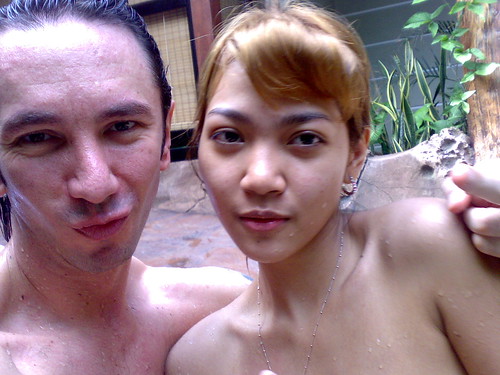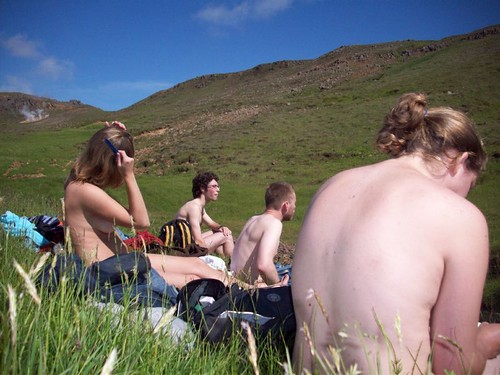Cliff hanger? Of the many issues concerned with soaking in general, clothing or the lack of this seems to be an ever returning issue. And a divider between the communities who adhere to the principle the less the better (purists?), whereas others see bathing as an obscenity and if public bathing is essential (for health reasons) then preferably fully clothed (the prudists).

'A group of Mosuo women and tourists bathing in the famous hot springs of Yongning, Yunnan province, China. August 2007'.Pure?
What brought me to this subject was a photo in the April issue of the international National Geographic magazine. Due to copyright and so forth I can't post the photo nor give the exact location but only the link to the photo slide show. About half way through you'll come across the photo. It's caption is
But aside of this there was a response on racialicious.com to this photo and is as follows:
'Lisu women bathe in thermal pools to celebrate the coming of spring. A proposed dam would drown this site, one of the valley's few remaining public baths. Developers have turned other springs into tourist resorts'.This caption and photo sums up all what's wrong with soaks in Southeast Asia. (even though it's China, but Yunnan is a bit inbetween the two!) The soaks are disappearing or are being sold out, often to get rich quick schemes. The caption also seems unrelated, all the persons doing here is having a bath, but by the looks of this you could say it's a celebration of sorts.
But aside of this there was a response on racialicious.com to this photo and is as follows:
'there was an article about a town in Western China that’s dubbed itself Shangri-La, there was a picture of topless women bathing in a hot spring spa. It was, as is almost always the case with NG, [National Geographic] a nicely framed photo, but I immediately questioned whether they would have shown a picture like that of a group of women in say, Iceland, or Wyoming. I think not. To me, it was a glaring double-standard and strong evidence of othering. Naked “other” breasts in NG are practically a cliche'.Double standards (besides being racist one could also state that it is sexist) or not the photo itself does raise some issues concerning bathing rituals, worldwide and in Southeast Asia. Here at Soaking in Southeast Asia, we've waded into this debate briefly; on a few occasions just getting our toes wet so to say:
- March 29, 2009 (Thai comment on Japanese onsen customs):
'One inhibition for most Thai and even some Westerners, is the going naked part. But once you overcome it, the rest is easy and enjoyable. Keep in mind that you can use a little tower to cover your private part when out of the water. Sure enough the Japanese themselves do so too’.
- February 28, 2009 (on Nepal and Rules of Chinese traditional hot spring bathes - Taiwan):
'most bathed in their underwear'
and''Requiring every person to soak only in their birthday suits seems to be a sanitary issue".
- January 14, 2009 (Japan):
'In fact, I found I really enjoyed talking with the other bathers--maybe I too could get hooked on mixed bathing'.
and'Are there any hot springs in Southeast Asia where bathing au-naturel and co-ed is practiced? No? Well, who know's there might be business opportunity here ....'
- January 11, 2009:
- 'Issues I often come across when debating hygiene standards of various hot springs sites in Southeast Asia, are those of various standards of dress. In my belief (which seems logic) the more clothing worn during bathing, the more unhygienic. So au-naturel bathing should be encouraged. But not in conservative Southeast Asia; both Buddhists as well as Muslim frown on any state of undress. Though Hindu Bali seems more relaxed on this issue, those in charge still feel compelled to signpost that bathers are being strictly forbidden to take to the waters starkers. Thus many are actually fully clad. ... I for one certainly understand it's not everybodies cup of tea (bathing au-naturel) but a certain degree of tolerance is all that's needed. It's sad to see age old traditions of tolerance of body and body acceptance eroded by narrow minded politicians clamoring for the moral high ground'.
- April 1, 2008:
' ... a pleasant skinny-dip can be had'.
- November 6, 2007 (concerns soaking in Thailand):
'Last year, I visited New Zealand and on 1 occasion rented such a 'cell'. Though it looked like a good idea at the moment, we hardly used it. Yes, you can pursue your own dress code, but you exclude yourself from the surroundings: is it rainy, sunny, windy, are birds whistling, is the vegetation green, who are my neighbours, what's my son up to? No way of knowing. I personally would like to soak 'au naturel' whenever, where ever, but somehow world societal norms are set against this. Beats me why?'
Nudity sells. The global community seems to be obsessed with this, a case in point are the photo's I put up on my flickr site; even a hint of skin results in much higher number of views. Most photo's count are anywhere between 0 and 20 views. But somehow this poorly taken photo rakes in more than 1500 views. Or this one on my waterfall photo's site which raked up more than 500. Or 200 plus for this? Or 200 for this. Before the month is done, these may well have doubled, just due to this posting!
 Simply captioned 'Ardent Hot spring': the bare neccesities of soaking in Southeast Asia?
Simply captioned 'Ardent Hot spring': the bare neccesities of soaking in Southeast Asia?
 Simply captioned 'Ardent Hot spring': the bare neccesities of soaking in Southeast Asia?
Simply captioned 'Ardent Hot spring': the bare neccesities of soaking in Southeast Asia?But back on subject. The not so established public hot bathing rituals of Southeast Asia require without exception a minimum of a bathers, though the more, the better it seems. Bali might be an exception but even there there are signs at hot springs asking all to wear bathing gear. In English and Bahasa, the former somehow implying that soaking clothed is not customary.

Not always to be avoided:
In bigger soak sites especially in Thailand and Malaysia, on offer are a couple of cubicles which might imply that yes, we understand that bathers are not for all, so if you insist, go ahead use these cubicles. However it seems that they might mean the opposite. Shy, not to worry, you can lock the door. But au-naturel en public? Non!'Jessy and Me at Sunkei in Malaysia...staying at luxury villa ..Hot Springs....Peaceful...Quiet....
SUCH A gREAT tIME IN the outdoor private Jacuzzi....nice ya...'
In Singapore it's even a crime, as it's considered obscene!
'The pair of undergraduates who sauntered through Holland Village in the buff in January have paid for their prank. They were fined $2,000 each on Thursday, the maximum fine for an obscene act'.However Asian culture differs, not only in Bali. The prior mentioned sign shows that just outside Southeast Asia's borders standards differ. And a little farther afield in Japan standards are completely the opposite much to the chargrijn of US visitors!
On the other side Japanese nudity is so common, it's strange to them that tourists make their way to Japan just for the opportunity to enjoy the soaks as the locals do:
'Yoshio Ono, president of Osenkaku, which manages Takaragawa Onsen, explains that there had been many foreign customers from before, such as Philippe Troussier, former coach to the Japanese national soccer team. “However, the number of foreign customers has increased from late last year, and there are weekdays when over 70% of our guests are from overseas. They’re well-mannered too,” he says'.Though some local visitors are dumbstruck:
'“This is about the only place where you can have a close encounter with naked blond-haired women. It appears that the hair on the head may be blond but the color below could be different.”
Here's a report from a naturist in Japan, but most blogs on onsen's just simply ignore the nudity issue: it's a non-issue!
Part of the taking the moral high ground within Asia is due to development. The further away from development, the less the likelihood that mores suggest a certain dress code.
Part of the taking the moral high ground within Asia is due to development. The further away from development, the less the likelihood that mores suggest a certain dress code.
In historical tense bathing more or less au-naturel was the way to go. But as stated elsewhere in this blog, affluency meant the need to distinguish oneselves, what better that to show off wearing expensive clothes?
But possibly times are a-changing. For instance, the emphasis of the spa industry on naturalness might imply bathing au-naturel to be trendy. It could catch on! The above example from Japan clearly shows that there's a market for soaking purists. And other examples from the region seem to imply that being uptight is only for the rich and possibly powerful. What better way to express power than to order everyone around. Me? Just give me an option, is that to much to ask for?
 Photo caption:
Photo caption: 'after bathing in the hot river [in Iceland]. we tried re-enacting the cover of the new sigur ros album, but there wasn't any road with a guard rail to jump over. i met this people just a few hours before, but if you can jump into a river naked with them, why not? (never mind the amused/embarrassed looks of passers-by)'.Is this just pure natural fun?]









No comments:
Post a Comment